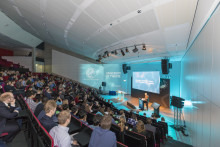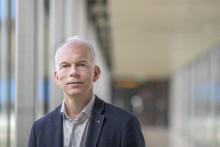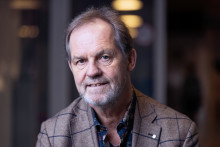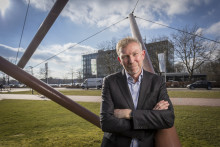The Max Planck Gesellschaft has 16 centers all over the world and the UT’s new addition is the very first Max Planck Center in the Netherlands. It combines the resources of two UT research groups, Detlef Lohse's Physics of Fluids and Albert van den Berg's BIOS Lab-on-a-chip, and two Max Planck Institutes in Göttingen and Mainz in Germany.
Today marked the official start of this international collaboration with an event at the UT campus, which included talks by UT and Max Planck representatives, government officials, as well as scientists from the field of fluid dynamics.
Scientific superstars
‘We can’t exist without global partnerships and it is only logical to start with our German neighbors,’ Van der Chijs said in his opening speech. ‘Max Planck Institute is a great strategic partner. The main investment lies in human capital – we are connecting scientific superstars.’
‘Max Planck Institute is an elite organization that really does include an extra class of scientists, but it should not be only for established academics. We want to attract young people from all over the world. It is important to create an international network. If you want to be excellent in science, you need diversity; you need an international attitude, not a provincial one,’ stated Prof. Martin Stratmann, the president of the Max Planck Gesellschaft. ‘The challenge of fluid dynamics is great, but so is our team and facilities.’
‘Fundamental research with an eye on applications’
Complex fluid dynamics have a vital role in renewable energy, chemical reactors, shipping, inkjet printers and biological processes. One research area, that the Max Planck - University of Twente Center for Complex Fluid Dynamics will focus on, is particles in turbulence. The facilities shared within the center, such as the water tunnel at the UT or the wind tunnel in Göttingen, are ideal for research in this area.
‘We do fundamental research with an eye on applications,’ explained Prof. Eberhard Bodenschatz, director of the Max Planck Institute for Dynamics and Self-Organization. ‘Studying particles in turbulence is important, for example, for astrophysical applications. It could teach us about how planets are formed. Understanding how particles clamp up would also allow us to understand pollution or weather forecasts.’








